A growing online trend which has seen children as young as seven adopting complex skincare routines is "encouraging children to become more and more self-obsessed" according to a leading dermatologist.
The 'Sephora kids' trend, as it is dubbed by social media users, refers to the children and young teenagers who shop at the beauty retailer before sharing videos of their purchases and skin-care routines online, emulating the influencers they follow. Anti-ageing products often form part of the routines.
Dr Rosemary Coleman, a Consultant Dermatologist at Blackrock Clinic in south county Dublin, has expressed concern that the trend could negatively impact children.
"It's absolutely shocking. We're adding to anxiety and we're causing problems with their skin as well," Dr Coleman told Prime Time.
Dr Coleman first became aware of the trend when one of her patients said that her 10-year-old has a more elaborate night-time skincare routine than her.
Another patient told Dr Coleman that she asked her 13-year-old if she had everything she needed at school on the first day of term. The patient’s daughter told her she needed "a serum," because "all the girls have a niacinamide serum."
Niacinamide serum is used to calm skin redness due to conditions like acne, rosacea and eczema. It can also be used to reduce signs of ageing.
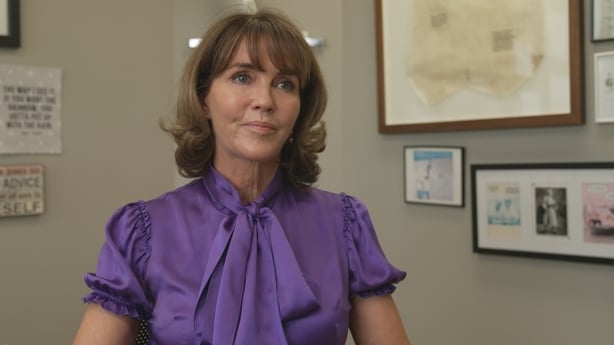
The 'Sephora kids' online trend is a phenomenon that started in the United States. It has also become popular amongst Ireland’s so-called Generation Alpha, the generation of children born after 2010.
The trend's prominence on the likes of TikTok is evident in the popularity of ‘Get Ready With Me’, often shortened in hashtags to ‘GRWM’, content which involves posting a video or series of photos showing the process of getting ready for an event or activity.
Some young people who spoke to Prime Time about how they enjoy creating content and engaging with others on social media about skincare, and believe it is beneficial to them.
However, they warned about some products and the harm they perceived had been done to their skin.
Several teens said they suffered "breakouts" after using certain products.
Ava Blackmore, known on TikTok as @grwmava31, is a 13-year-old Irish content creator from Dublin who shares her skincare routine with her more than 75,000 followers.
"I think it's really important to look after your skin. I have to maintain my acne and just make sure it doesn't get any worse, but I find it really entertaining just doing my ‘Get Ready with Me's’ every morning or night," Ava told Prime Time.
But her experience with maintaining a daily skincare routine hasn’t always been positive.
Ava got irritation from using a trending toner, popular amongst her demographic.
"It burned my skin. I’d say [for] about two months that my breakouts were getting really bad and just really harsh," Ava said.
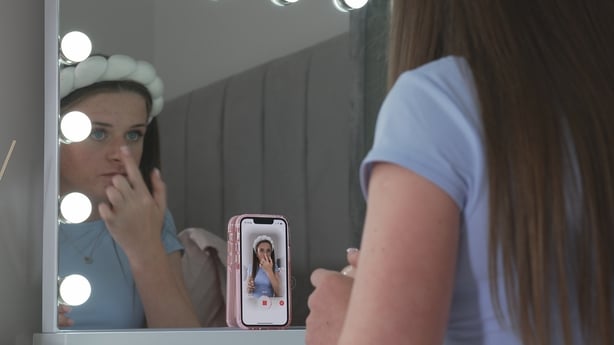
Another teen who has been following a skincare routine for around two years is 14-year-old Sophie Deady from Waterford. After using one popular brand, her face started to become "really dry."
"I was getting spots on my face, and I was trying to get rid of them, but then that kind of cured," she said, "and then I was using [another popular brand] and it broke me out again."
Scaly, red skin
Emma Fraher Power is the owner of The Ivy Wellness and Beauty Salon in Newtown, Co Waterford. She says she sees children as young as seven coming in to ask for skincare advice.
When asked what young clients are looking for, Ms Fraher Power said, "They tend to go for the strong retinols, and this is something that I would like to avoid on the young skin."
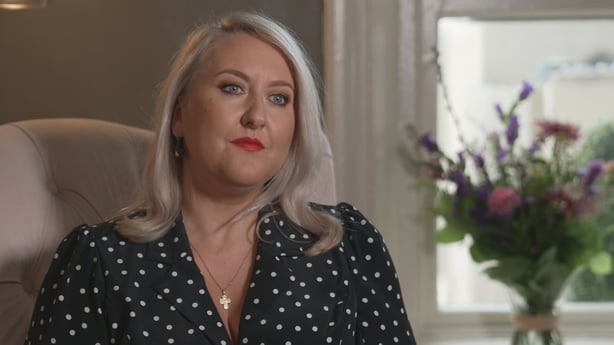
Retinol, which has been used in skincare for the last 30 to 40 years, is popular among some online creators from Generation Alpha.
It is a form of Vitamin A that is used for treating skin conditions like acne. It can also stimulate collagen and have anti-ageing benefits such as improving fine lines and wrinkles.
But according to Dr Coleman it can also have a negative impact on at least 30% of the population.
"I couldn't use them at all because every time I would apply them, I would get scaly, red skin, and many people are like me," she said.
Retinol can be bought over the counter in creams and serums, but products prescribed by a doctor can be more than 20-times stronger according to Dr Coleman.
She says there is "no role" for anti-ageing serums in a child's skincare routine unless they require them for medical purposes.
"If I have an eight-year-old who has severe comedonal blackhead acne, I will definitely prescribe a retinol as a very good product," Dr Coleman said.
"But there is no role for an eight-year-old with completely normal skin to be applying a retinol as an anti-ageing product because they have heard an influencer on social media saying that the sooner they start anti-ageing ingredients, the better, and that they will prevent ageing, which, of course, is not possible," Dr Coleman added.
A study from the dermatology department at Tallaght University Hospital in Dublin has been looking into the trend by examining content on TikTok, Instagram and Facebook with the hashtag #tweenskincare that targets girls aged between nine and 12.
The study analysed 150 social media videos promoting teen skincare. Only a fifth of the videos advised against using harmful products on young skin. 78% directly promoted a skincare product.
More than half of the videos promoted products like toners and serums. Many more advertised items that contain fragrances (35.6%), chemical exfoliants (30.5%), antioxidants (12.7%), vitamin C (7.6%) and peptides (6.8%) which are active complexes for anti-ageing.
The average cost per product promoted was €28.39.
Growing market
The teen and tween skincare market is big business and is growing. Some companies which sell skincare products believe it can be beneficial to young people to develop a responsible skincare routine, using ingredients which are safe for children.
One brand aimed at "tweens, teens and twenty somethings," is the UK-based Bare Addiction. They offer a range of products, including some containing actives like Salicylic Acid and Niacinamide.
"When we designed Bare Addiction, it was always to be a teen brand," founder Mark Poole said.
"So, from the first day that we decided what ingredients, what products we wanted, we consulted dermatologists and formulation scientists with the specific thought in our head: 'This needed to be for young skin’," Mr Poole said.
"I think a lot of brands have realised that there are more and more tweens and teens that are interested in skincare. They use more skincare than any generation before them and they spend more, or their parents spend more, but they are a market now that more brands are focusing on," Mr Poole added.
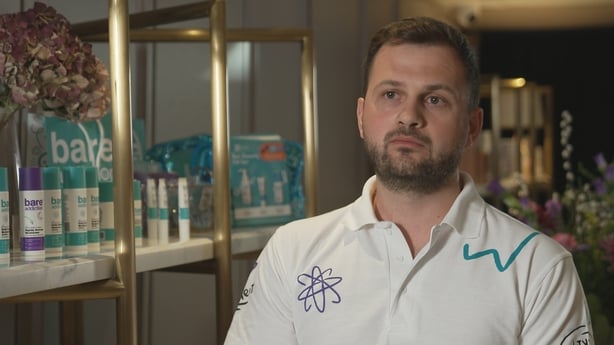
New York-based Evereden is a premium skincare and haircare brand that creates products for mothers, babies, kids and teens. Carolyn Curry, Marketing Director of Evereden, told Prime Time using such products can help children and parents develop good habits.
"We view a kid's skincare routine as a basic hygiene. Just like kids need to wash their bodies at the end of the day, put on sunscreen when they're in the sun, they should also cleanse their face," she said.
"As long as kids are not using products that are too grown for them, significantly alter what they look like, make them look different. We think that skincare is healthy and safe."
Part of what makes Evereden's packaging unique is the cartoon smiley faces printed on their bottles. The say their products were created to be "safe and scientifically formulated for the whole family."
"With things like smiley faces and bright colours in the packaging that appeal to kids, we are really trying to make products that make this process easier for parents," Carolyn Curry, Marketing Director of Evereden told Prime Time.
"When you're trying to put sunscreen on your kid's face in the morning and they're really resistant and they're being frustrating, if they like the product and look of it and you can make it almost like a game or they treat a sunscreen like a toy, that makes mornings just a little bit easier for parents," Ms Curry said.
Feeling the pressure
The cost of many of the products means parents are feeling the pressure of the 'Sephora kids’ trend.
"It's a very expensive trend, because as they're growing up, they're looking for the expensive," Waterford teen Sophie Deady’s mother Clodagh said.
"They all want to try this hyaluronic acid. I think for a teenager, €10, €15 should be max for their skincare," Ms Deady added.
For a lot of children, their skincare routine can contain up to seven products. This doesn’t include makeup, which many choose to apply afterwards.
"I have a light facial wash," ten-year-old Josie Reddin told Prime Time at a ‘Girls Night’ event hosted at her mother Michelle’s beauty salon The Glamour Pit on Meath Street in Dublin’s south inner city that was run as part of the Liberties Festival in July.
"I have this light moisturiser from Bubble [Skincare]. And then I normally spray some little sprays," Josie says, describing her skincare routine which includes a lip mask she puts on at night and a facial mist.
Childhood is ‘shrinking’
Child psychotherapist Dr Colman Noctor first encountered the trend when his daughter asked for skincare products for Christmas last year.
"She was very young to get involved in that, and actually, at eleven, she was probably behind the curve. There was much younger children looking for the same thing," Dr Noctor said.
Dr Noctor feels the trend is creating anxiety and "pressure to conform" as children carry out multi-step skincare routines daily.
"When we looked into it a little bit more, there was much more of an anti-ageing sort of element to it. And that just seemed preposterous to me, that an eight and nine-year-old would start to be concerned around ageing," Dr Noctor said.
He says "childhood is shrinking" with social media now having an increasing influence on young people's development and how they view themselves.
"We're not born disliking ourselves. We learn that over time," Dr Noctor added.
Dr Noctor believes that introducing skincare can put pressure on self-worth and self-belief and may create a feeling of not being "enough," which can lead to consequences such as mood disorders, eating disorders, and anxiety.
He urges parents to be the counter narrative and explain to their child that this trend is not age appropriate for them.
"If you're the unpopular parent when it comes to skincare, the reality is you're probably in the right," Dr Noctor said.
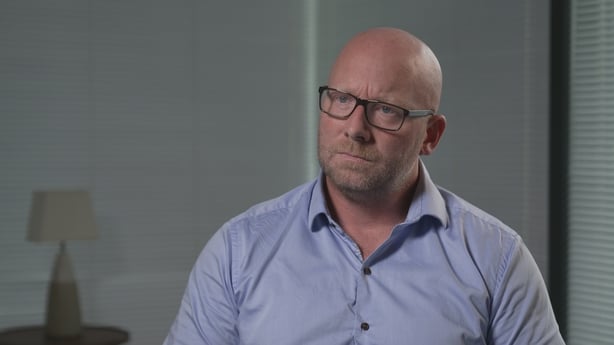
Dr Rosemary Coleman from Blackrock Clinic agrees and thinks parents need to be more aware of the risks involved.
"If you found your child was buying cigarettes on the internet, would you intervene and stop, or are you going to be helpless? I think the parents need to realise that the children are doing harm, both physically and psychologically," Dr Coleman said.
EU restrictions
Efforts have been made worldwide to place tighter regulations on skincare products targeted at children.
In the US, Alex Lee, a member of the California State Assembly, tried to pass a bill to ban the sale of anti-ageing products to under-13s, but was unsuccessful.
The Personal Care Products Council (PCPC) said it was "well-intentioned", but it threatened to "overregulate products that are safe and essential for healthy skin care," like sunscreen and moisturiser.
In Sweden, popular pharmacy chain Apotek Hjartat has set an age limit of 15 on certain advanced skincare products like Vitamin A and while Ireland doesn't currently have any specific restrictions in place, the European Union is aiming to reduce the amount of retinol, retinyl acetate and retinyl palmitate in products starting at the end of this year.
"We don't know the long-term damage that they may be doing to their skin if they start to use active ingredients like retinols at this age," Dr Rosemary Coleman said.
"We will probably know all about it in 10 or 20 years, and that will be interesting."
A report from Ceri Doyle and producer Isabel Perceval on this topic is broadcast on the 29 August edition of Prime Time on RTÉ One and RTÉ Player.

